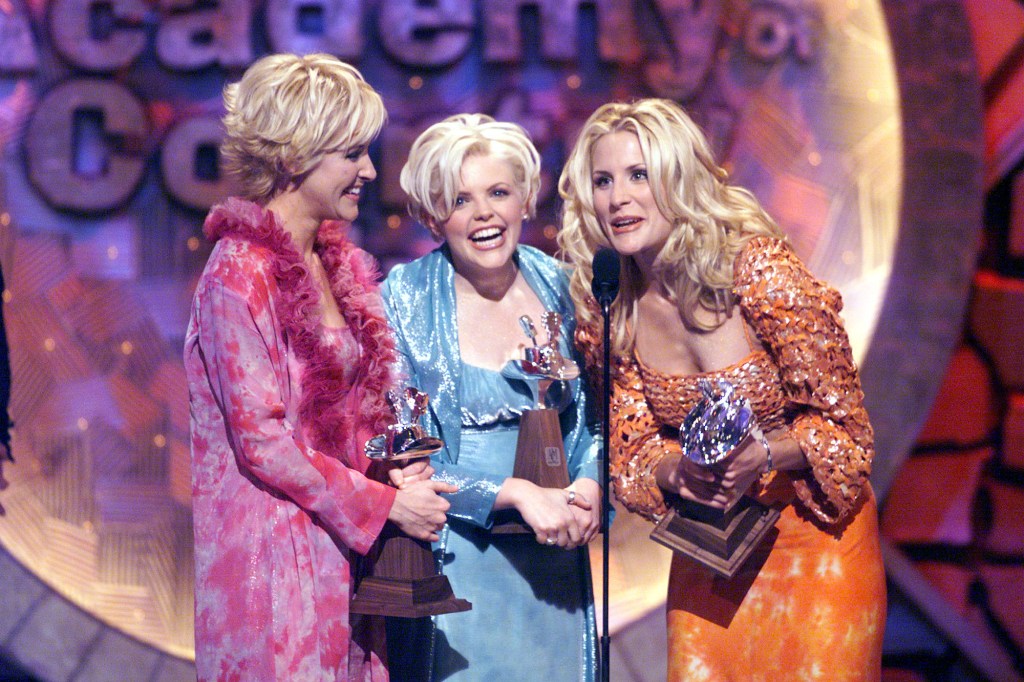On Aug. 31, 1999, the Chicks (formerly the Dixie Chicks) released their album Fly, the trio's second album with Natalie Maines as lead singer. The album debuted at No. 1 on the Billboard chart and received a diamond-selling status from the RIAA.
Beyond its record-breaking sales, to understand what a cultural juggernaut the album was, you have to remember that Fly's release came four years before the band was effectively blacklisted from country music following Maines' comments onstage in London on March 10, 2003 when she stated, "We do not want this war, this violence, and we're ashamed that the president of the United States is from Texas."
In 1999, the Chicks were only known as modern country music saviors. The trio honored country's roots while pushing it in new directions and brining the genre to new audiences. And to young women hooked on country radio, the Chicks were everything— cool, funny, spunky outspoken artists who played banjos and fiddles and appeared in hip ads for Candie's shoes. (Ok, the ads were very cool at the time.)

Getty Images
Fly, produced by Blake Chancey and Paul Worley, built on the success of Wide Open Spaces, exploring themes of independence, desire and loss.
The album's first single, the Celtic-inspired "Ready to Run," was a song from the perspective of a woman who's not ready to be tied down because she was having too much fun on her own. It exemplified everything we loved about the trio.
The second single took a different approach. Written by Martie Maguire and Marcus Hummon, "Cowboy Take Me Away" is a lyrically rich celebration of being alone with your significant other. Also, the closing instrumental alone is enough to make you pack up and move to a secluded cattle ranch in Montana with your significant other. It's just that good.
Fly also contained the Chicks' first brush with controversy with the 2000 single "Goodbye Earl," a story song about two friends who kill an abusive husband. Though the song was written by a man — celebrated country songwriter Dennis Linde — there were more than a few folks that deemed the Chicks "man-haters" for recording the tune. According to an article in the L.A. Times, about 20 out of the 149 radio stations tracked by Radio & Records refused to play the song. Inside the liner notes, the trio issued a disclaimer: "The Dixie Chicks do not advocate premeditated murder, but do love getting even." Controversy aside, playing "Goodbye Earl" in a crowd of millennials will result in nearly everyone singing along to the tale of Mary Ann and Wanda's retribution.
The song sent the message that the Chicks were bound and determined to say what they wanted however they wanted, a fact we were reminded of when listening to the wickedly fun "Sin Wagon," one of the few country songs to openly and unapologetically celebrate "mattress dancin'."
The trio further let loose with "Some Days You Gotta Dance," originally recorded by Keith Urban's short-lived band The Ranch. (Urban also plays guitar on the Chicks' version.) But it wasn't all upbeat. The women sang of heartache and broken relationships on "Without You" and "Cold Day in July" and reluctance to let someone in on "Don't Waste Your Heart."
In addition to their own co-writes, the Chicks called on some of Nashville's best songwriters for the album, recording Matraca Berg and Annie Roboff's "If I Fall You're Going Down With Me," Darrell Scott's Nashville lament "Heartbreak Town" and Jim Lauderdale and Buddy Millers' "Hole in My Head." But perhaps the most striking is their exquisite rendition of Patty Griffin's "Let Him Fly."
As we continue to have a necessary conversation about the lack of women played on country radio and the marginalization of female artists within the genre, it's important to reflect on what the Chicks and their music meant to those who grew up listening to them. As one of the boldest and most joyous country albums of the last 20 years, Fly sounds as relevant and important now as it did then — if not more so.
Editor's Note: This article was originally published on Aug. 30, 2019.




